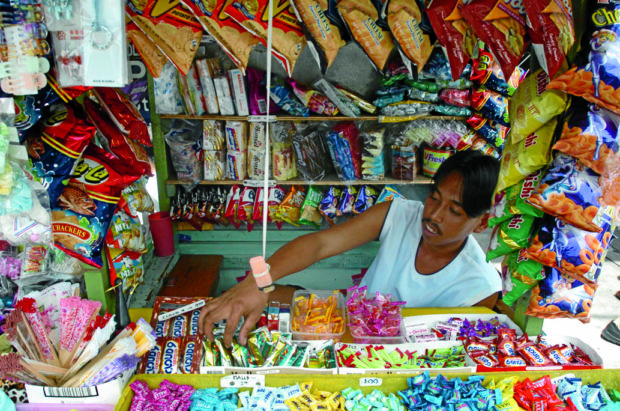Reconsider tax law on sweetened drinks, Duterte urged

NO TO TAX MEASURE “Sari-sari” store owners like Rhoel Santos fear diminished income
once Congress approves the Duterte administration’s tax reform package. —INQUIRER PHOTO
A group of store and carinderia owners appealed to President Duterte and lawmakers to reconsider passing the proposed tax law on sugar-sweetened beverages (SSBs) because it will lead to increase in price of some sweetened products thereby gravely affecting the sector.
Citing the latest study by the Philippine Chamber of Food Manufacturers Inc., the implementation of P10 tax per liter volume capacity on sugar sweetened beverages will be the highest in the world and will mostly hit the poor.
“A typical sari-sari store owner earns an average of P1,000 per day, 30-40 percent of the total, around P300 to P400, comes from the sale of coffee, juice and carbonated drinks, so almost half of our net income is from the sale of sweetened beverages, said Philippine Association of Stores and Carinderia Owners (PASCO) President Victoria “Nanay Vicky” Aguinaldo.
Aguinaldo added that if the Tax Reform for Acceleration and Inclusion (TRAIN or House Bill 5636) is approved, a 3-in-1 coffee sachet, currently priced at P5, will be P8; a 1-liter bottle of juice concentrate currently priced at P9 will have a retail price of P30; a 1-liter bottle of tea currently priced at P20 will be P30; carbonated drinks currently being sold for P15 per liter, will cost P25; and a 1-liter tetra of ready-to-drink juice, currently priced at P20 will be P30.
Included in the bill are all sweetened juice drinks; sweetened tea; sweetened coffee; all carbonated beverages with sugar, including those with caloric and non-caloric sweeteners; flavored water; energy drinks; sports drinks; powdered drinks not classified as milk, juice, tea, and coffee; cereal and grain beverages; even non-alcoholic beverages with sugar.
Article continues after this advertisementBased on the latest statistics on the number of registered sari-sari stores in the country, there are currently 1.3 million sari-sari stores nationwide. It is estimated that 91% of all retail stores in the country are sari-sari stores.
Article continues after this advertisement“Sari-sari stores form part of the economic backbone of the country. Providing them more opportunities can only mean greater economic development for our nation as a whole,” said DTI Secretary Ramon Lopez at a gathering held recently.
“If the TRAIN or HB 5636 is passed into law, it is feared that at least half of the current number of sari-sari stores nationwide will eventually close shop because it will no longer serve as a viable source of additional income for the family household. It will therefore directly or indirectly translate to around 133,750 jobs lost; an increase of 1.5% in the unemployment rate; a P20-billion decline in beverage sales; around a P2.4-billion loss in VAT; a P7- billion loss from affected industries; and more than P130 billion investment losses for the Beverage Industry Association of the Philippines” added Aguinaldo. JE